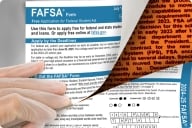You have /5 articles left.
Sign up for a free account or log in.
This may be the year for fiction on college admissions. In March we had "Admission," the Tina Fey movie based loosely on a novel of the same title. And now we have Early Decision (HarperCollins), a novel about a woman whose job is to help applicants write their admissions essays. The author -- Lacy Crawford -- worked for 15 years in just such a position, catering to the extremely wealthy applicants for whose families anything short of a few Ivies would be considered failure. The novel follows the essay-writing experiences of four wealthy students and one low-income student -- as they frame and reframe their essays, with some help.
The colleges named are real (and predictable). In an introductory note, Crawford says this about the "truth" of the novel: "While it is true that this book is based on stories of some of the more than 100 college-bound students who suffered my time, counsel and Track Changes, no real person is depicted in these pages. Furthermore, though the universities named are real, admissions-office shenanigans are widespread, and therefore no school is more culpable than any other, and I have not pointed fingers here. Where a university is named in a certain act, it can only be assured that the university in question did nothing of the sort."
Via e-mail, Crawford answered questions about her novel and the issues her former career raises about the admissions process.
Q: Can you describe what you did and how much you charged for typical clients -- and for those on the high end?
A: First off, I have to say that the high-end clients were my typical clients. I never did this work full-time (I always had other jobs, sometimes in quite large roles), I didn’t advertise, and I didn’t talk much about what I did. So the only parents who found their way to me as paying clients did so by word of mouth, and that meant a certain sort of parent. I had one rate. Everyone else I worked with, including underserved high school seniors who found their way to me through guidance counselors or volunteer programs, paid nothing.
When I first started out, in 1998, I helped students with almost every aspect of the process — setting a deadline chart, strategizing about essays and letters of recommendation, even licking stamps for envelopes to give to teacher recommenders (back in the days of paper!). I worked with students in person two or three days a week, often for hours at a time, and in the beginning I charged $1,500 a student for the entire process, July/August through the submission of the last application.
As I gained experience, I stopped tracking all the little bits and pieces, and focused more on working with young people to help them take the reins of the process. We’d research schools together, bat around essay ideas, and of course, go through draft after draft of revisions. The hope was to help them sidestep their and their parents’ anxiety and move into ownership of the process, at which point I didn’t have to nag about deadlines or forms because the students were on top of everything. Again, I sat with students for hours at a time, one or more days a week. I was available by phone and e-mail to the family for months, and for clients who did not fly me to work with their children, I tried to find a way to visit with them for at least a few days in person by flying in for other reasons (for work, or to visit family and friends, say). By the end, for this service, I charged $7,500. (Obscene, isn’t it? But relative to the offerings for clients such as mine, it was quite a good deal.)
I have also had pro bono clients almost every year (I did not always when I was living in London), who paid nothing, and I have always had an hourly rate for students who are remote or only want occasional help with essay drafts. This topped out at $250/hour, and I billed sparingly.
Across the board, I served as a confidante for parents who were going through a harrowing process that they often felt they did not understand. They didn’t want to harass their child’s college counselor, and they couldn’t talk to other parents because they, too, were so terribly nervous. So the very simple questions -- "Does he need three SAT subject tests? Should we have her take the AP exam, or not? Should he apply to Yale because our neighbor has offered to write for him? Do we have to go visit every school on the list?" — these things I was able to help with, and that went a long way toward helping parents feel slightly less overwhelmed.
One thing I never tried to do was replace a student’s school college counselor. I relied on families to work with their counselors to choose the list of colleges to which a student would apply, and I made recommendations only when asked, and based only on my experience. Because I kept in touch with so many students, by the later years I was able to offer a fair amount of anecdotal advice, but I have never tried to game the system by meeting admissions officers, networking with power brokers, or the like. I never sought to drive the process. And I’ve always insisted that school college counselors review (and approve) my students' essays before they were submitted.
Q: What's the worst thing a parent ever asked you to do?
A: In Early Decision, there’s a father who rewrites his son’s Common Application essay after his son has been rejected early decision by his first-choice school. In the revision, the father argues -- in the first person, ventriloquizing the boy -- that communities benefit from a range of people, the superstars and the average alike, and that the student should be admitted to the other schools on his list not because he is stellar but because he is not. This happened. On the night in question, the father summoned me to proofread his new essay before ensuring that his son submitted it. It broke the boy’s heart, and it broke mine. (I did not oversee submission of that essay. I told the student how I felt, and left it in his hands to decide what to do.)
Q: In your novel, parents seem like the villains (much more than do students or colleges). Are parents out of control generally, or do you think this is true primarily of those in the upper economic stratospheres?
A: Parents aren’t out of control generally, no. Their anxiety may be out of control, but for the most part, parents behave very well. It is certainly the case that at very high levels of income and influence, a sense of entitlement colors the judgment of some parents. But across a wide band of communities, there is a fair amount of dirty dealing going on, by which I mean not only parents doing everything they can to give their kids a leg up, but also parents overlooking the fact that their children’s development is more important than where they are admitted to college. We may read about parents doing ridiculous things and think, "Whew, we’re so glad we’re not that crazy," and that’s true.
But where do we draw the line? When does support become manipulation? When does tutoring stop helping a child, and start teaching him that on his own he’s not good enough? How can we come to realize that character -- resilience, curiosity, dedication, a moral compass -- is the prize here, and value that over the name on the diploma? Over time, I think, parents know this. But in the heat of senior fall, when everyone is feeling crazy, perspective can become clouded.
Q: As one who has coached applicants on their essays (and now has written a novel about that), how do you define the line between legitimate help and doing so much that the essay is no longer the student's?
A: In a word, composition. The work of drafting -- generating ideas and the phrasing of those ideas -- has to come from a student. An editor can suggest changes to mechanics (grammar and punctuation), can point out where ideas aren’t linked or word choice is off, can help offer workarounds for tricky constructions (for example, where a student is ending on a preposition, knows that feels wrong, and ends up with an inside-out sentence). But the movement from concept to written language has to be the student’s own.
Q: Some colleges have taken to asking applicants if they received help on essays. Do you think this is an appropriate question to ask? Do essay questions favor students who can get coaching?
A: Absolutely. I’d take it further and ask, "How were you helped?" It would be fascinating to me to read students talking about how they were helped by, say, a conversation with their father, or the first-draft suggestions of their best friend, not to mention the revisions of the college counselor and any outside hired guns. You could learn a lot about a student’s understanding of scholarship and collaboration this way.
Applications are never going to be transparently produced unless they’re administered in a proctored exam hall. Given this, admissions officers will do well to consider the portfolio as a whole (as of course they do): a privileged student with a fabulously polished essay and a B-minus in English 4 may throw up some question marks. But I don’t think most seasoned readers need to make these comparisons. A coached and packaged student, in my experience, sounds that way: branded rather than encouraged. There’s something hollow in the tone, however impressive the sentences.
Q: If an admissions dean or the Common Application asked you for a essay prompt that would truly yield good information about whom to admit, do you have a prompt or two to suggest?
A: I have two ideas. The first is your idea, above. A college could request the usual Common Application personal statement, with one of those six prompts, and then in a supplemental essay ask the student to walk the reader through the preparation of that essay: from first inkling to final draft. A fascinating question, I think, and one that might yield a fair amount of information about the student as a student, a thinker and worker. I can imagine a lot of applicants bristling at this question, and thinking it foolish, but I think it might lead to some wonderful answers, particularly if students were made to believe that it’s not wrong to seek thoughtful advice on a critical piece of writing.
The second is an essay question that sat as a supplement for a long time on an application I saw often. I am forgetting the school now -- and kicking myself for that -- but the question asked students to offer page 216 of their autobiography,
which they had presumably penned some years down the line. I have always thought this was a wonderful question, because it requires real creativity, and also some tricky mental footwork to imagine the work as a whole and remove a slice. Finally, it encourages students to dream of themselves telling their own stories in the future. Not just, "Where do you want to be in 10 years?," but, "What will you say about yourself then?" A lovely trick of throwing the self forward in time, and revelatory, I think.








